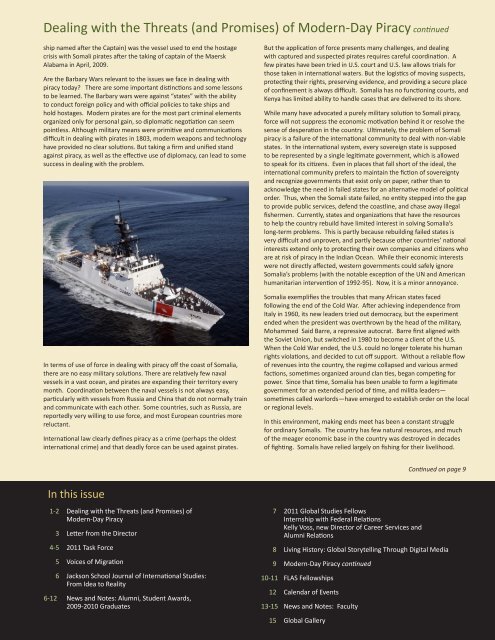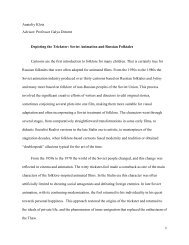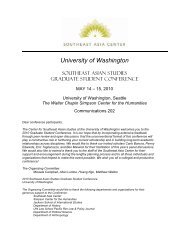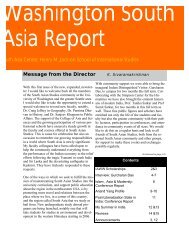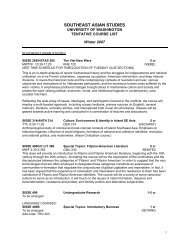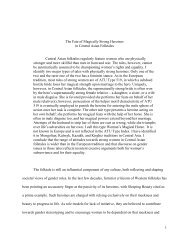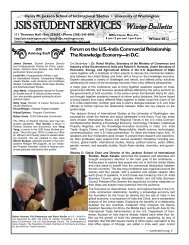global studies - Jackson School of International Studies - University ...
global studies - Jackson School of International Studies - University ...
global studies - Jackson School of International Studies - University ...
You also want an ePaper? Increase the reach of your titles
YUMPU automatically turns print PDFs into web optimized ePapers that Google loves.
Dealing with the Threats (and Promises) <strong>of</strong> Modern-Day Piracy continued<br />
ship named after the Captain) was the vessel used to end the hostage<br />
crisis with Somali pirates after the taking <strong>of</strong> captain <strong>of</strong> the Maersk<br />
Alabama in April, 2009.<br />
Are the Barbary Wars relevant to the issues we face in dealing with<br />
piracy today? There are some important distinctions and some lessons<br />
to be learned. The Barbary wars were against “states” with the ability<br />
to conduct foreign policy and with <strong>of</strong>ficial policies to take ships and<br />
hold hostages. Modern pirates are for the most part criminal elements<br />
organized only for personal gain, so diplomatic negotiation can seem<br />
pointless. Although military means were primitive and communications<br />
difficult in dealing with pirates in 1803, modern weapons and technology<br />
have provided no clear solutions. But taking a firm and unified stand<br />
against piracy, as well as the effective use <strong>of</strong> diplomacy, can lead to some<br />
success in dealing with the problem.<br />
In terms <strong>of</strong> use <strong>of</strong> force in dealing with piracy <strong>of</strong>f the coast <strong>of</strong> Somalia,<br />
there are no easy military solutions. There are relatively few naval<br />
vessels in a vast ocean, and pirates are expanding their territory every<br />
month. Coordination between the naval vessels is not always easy,<br />
particularly with vessels from Russia and China that do not normally train<br />
and communicate with each other. Some countries, such as Russia, are<br />
reportedly very willing to use force, and most European countries more<br />
reluctant.<br />
<strong>International</strong> law clearly defines piracy as a crime (perhaps the oldest<br />
international crime) and that deadly force can be used against pirates.<br />
In this issue<br />
1-2 Dealing with the Threats (and Promises) <strong>of</strong><br />
Modern-Day Piracy<br />
3 Letter from the Director<br />
4-5 2011 Task Force<br />
5 Voices <strong>of</strong> Migration<br />
6 <strong>Jackson</strong> <strong>School</strong> Journal <strong>of</strong> <strong>International</strong> <strong>Studies</strong>:<br />
From Idea to Reality<br />
6-12 News and Notes: Alumni, Student Awards,<br />
2009-2010 Graduates<br />
2 CENTER 2 FOR GLOBAL STUDIES UNIVERSITY OF WASHINGTON<br />
But the application <strong>of</strong> force presents many challenges, and dealing<br />
with captured and suspected pirates requires careful coordination. A<br />
few pirates have been tried in U.S. court and U.S. law allows trials for<br />
those taken in international waters. But the logistics <strong>of</strong> moving suspects,<br />
protecting their rights, preserving evidence, and providing a secure place<br />
<strong>of</strong> confinement is always difficult. Somalia has no functioning courts, and<br />
Kenya has limited ability to handle cases that are delivered to its shore.<br />
While many have advocated a purely military solution to Somali piracy,<br />
force will not suppress the economic motivation behind it or resolve the<br />
sense <strong>of</strong> desperation in the country. Ultimately, the problem <strong>of</strong> Somali<br />
piracy is a failure <strong>of</strong> the international community to deal with non-viable<br />
states. In the international system, every sovereign state is supposed<br />
to be represented by a single legitimate government, which is allowed<br />
to speak for its citizens. Even in places that fall short <strong>of</strong> the ideal, the<br />
international community prefers to maintain the fiction <strong>of</strong> sovereignty<br />
and recognize governments that exist only on paper, rather than to<br />
acknowledge the need in failed states for an alternative model <strong>of</strong> political<br />
order. Thus, when the Somali state failed, no entity stepped into the gap<br />
to provide public services, defend the coastline, and chase away illegal<br />
fishermen. Currently, states and organizations that have the resources<br />
to help the country rebuild have limited interest in solving Somalia’s<br />
long-term problems. This is partly because rebuilding failed states is<br />
very difficult and unproven, and partly because other countries’ national<br />
interests extend only to protecting their own companies and citizens who<br />
are at risk <strong>of</strong> piracy in the Indian Ocean. While their economic interests<br />
were not directly affected, western governments could safely ignore<br />
Somalia’s problems (with the notable exception <strong>of</strong> the UN and American<br />
humanitarian intervention <strong>of</strong> 1992-95). Now, it is a minor annoyance.<br />
Somalia exemplifies the troubles that many African states faced<br />
following the end <strong>of</strong> the Cold War. After achieving independence from<br />
Italy in 1960, its new leaders tried out democracy, but the experiment<br />
ended when the president was overthrown by the head <strong>of</strong> the military,<br />
Mohammed Said Barre, a repressive autocrat. Barre first aligned with<br />
the Soviet Union, but switched in 1980 to become a client <strong>of</strong> the U.S.<br />
When the Cold War ended, the U.S. could no longer tolerate his human<br />
rights violations, and decided to cut <strong>of</strong>f support. Without a reliable flow<br />
<strong>of</strong> revenues into the country, the regime collapsed and various armed<br />
factions, sometimes organized around clan ties, began competing for<br />
power. Since that time, Somalia has been unable to form a legitimate<br />
government for an extended period <strong>of</strong> time, and militia leaders—<br />
sometimes called warlords—have emerged to establish order on the local<br />
or regional levels.<br />
In this environment, making ends meet has been a constant struggle<br />
for ordinary Somalis. The country has few natural resources, and much<br />
<strong>of</strong> the meager economic base in the country was destroyed in decades<br />
<strong>of</strong> fighting. Somalis have relied largely on fishing for their livelihood.<br />
7 2011 Global <strong>Studies</strong> Fellows<br />
Internship with Federal Relations<br />
Kelly Voss, new Director <strong>of</strong> Career Services and<br />
Alumni Relations<br />
8 Living History: Global Storytelling Through Digital Media<br />
9 Modern-Day Piracy continued<br />
10-11 FLAS Fellowships<br />
12 Calendar <strong>of</strong> Events<br />
13-15 News and Notes: Faculty<br />
15 Global Gallery<br />
Continued on page 9


